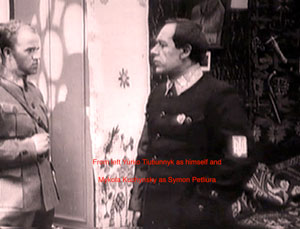 |
|||||||
|
|||||||||||
The Ukrainian Film Club of Columbia University has started a new project entitled “Rediscovered Silent Movies”. Its goal is to bring silent motion pictures made in Ukraine in the 1920-1930s to American and global viewer. Within the project, silent films that have miraculously survived in Ukrainian film archives and elsewhere but that have remained virtually unknown to the film historians and wider viewership alike are transferred onto DVD-carriers and supplied with high-quality English inter-titles and musical soundtrack. This time-consuming work is done on a volunteer basis by enthusiasts who support our efforts to return forgotten cinematographic heritage of Ukraine to the world.
There are some two dozen Ukrainian silent films gathering dust in the Oleksander Dovzhenko Film Center in Kyiv. They have slowly been disintegrating while Ukrainian Ministry of Culture has done little of nothing to preserve them. Some of these films have already been transferred from film into a digital format. With the exception of the silent films directed by Oleksander Dovzhenko, none others are available for either domestic or international viewer. The quality of subtitles generated for Dobvzhenko’s films leave much to be desired.
The defeated remnants of vile Ukrainian nationalists, headed by Symon Petliura, cannot accept their historical fate and are plotting an insurrection against the Soviet regime in Ukraine. There is nothing Petliura and his cohorts would not do to win back control over Ukraine, including selling it to the highest bidder, in this case, the Polish dictator Jozef Pilsudski. A group of plotters are coordinating an insurrection in Kyiv with an attack from Poland headed by Petliura’s general Yurko Tiutiunnyk. Predictably, the invincible Red Army defeats the nationalist plotters and proves that the Soviet borders are impregnable. Filmed in the wake of Petliura’s assassination by Sholom Schwartzbard in Paris on May 25, 1926, this political thriller is a typical example of early Soviet agitprop, which incorporates many of the important elements used in later Soviet and post-Soviet Russian movies that deal with the issue of Ukrainian nationalism. These elements include 1) the dehumanization of political enemies, presenting them as traitors to their own people and sell-outs to foreign powers; 2) the consistent association of essential traits of Ukrainian identity, such as the Ukrainian language, folk costumes, the national colors blue and yellow, and the national anthem, with provincialism and narrow-minded nationalism; and 3) the belittlement of the Ukrainian language through the singling out of certain linguistic features and expressions as nationalist and laughable. Many of these features are still very much present in the post-Soviet Russian discourse on Ukraine. Although aesthetically crude, the film contains a wealth of historical and cultural information for those equipped to read between the lines. It features unique footage of the legendary Ukrainian patriot Yurko Tiutiunnyk, who plays himself. He trusted the Bolshevik amnesty and returned to Ukraine to take part in socialist construction only to be later accused of anti-Soviet activities, arrested, and executed. The film also features Ukrainian Soviet actress Natalia Uzhviy in one of her early roles. The UFCCU will screen “PKP” on April 22, 2010 at Columbia University. The next film in this project will be “Night Coachman” (Nichnyi Viznyk), 1929, directed by Heorhiy Tasin. |
|||||||||||
